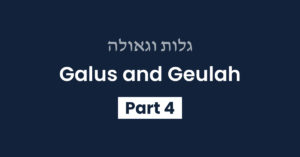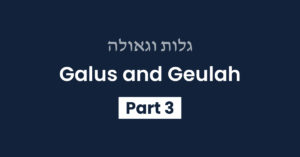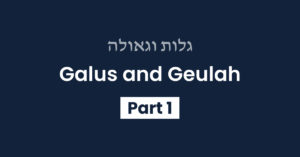We are now in the middle of the Nine Days, and Tisha B’v will be on Tuesday (unless Mashiach comes first!). We are focusing this month on concepts related to Galus (exile) and Geulah (redemption).
Last week, we explained that the reason why Hashem put us into Galus in the first place was due to the Sinas Chinam (baseless hatred) among the Jews in the times of the Second Beis Hamikdash. Since Sinas Chinam is rooted in having the mentality of a “taker,” Hashem put us in Galus in order to shake us out of our “taker” mentality. Being in Galus causes us to feel less secure and less comfortable, weakens our desire to overindulge in physicality, and reminds us instead to refocus our priorities. It helps us remember that Hashem didn’t place us on this earth in order to indulge in physical pleasures; rather, we are here to emulate Hashem and act as true givers.
The more we train ourselves to love our fellow Jews and to think with the mentality of a “giver,” the more we will show Hashem that we have understood the message of Galus, and the sooner Hashem will bring our ultimate Geulah.
This week, we will look at another message Hashem wants us to learn from our time in Galus: the importance of remaining separate from the non-Jewish nations around us.
Thinking Back to Egypt
When the Jewish people were slaves in Egypt, how did they merit to be redeemed?
Chazal1 teach us the answer: The Jewish people were redeemed because they did not change their names, language, or clothing. They continued to name their children Jewish names like Reuven, Shimon, and Levi. They continued to speak with the refined Hebrew language. And they continued to wear refined Jewish clothing instead of trying to blend in with the Egyptians around them.
Rav Dessler2 explains that it’s not just incidental that the Jews happened to keep these things the same. Rather, the fact that the Jews didn’t change their names, language, or clothing was actually accomplishing the entire purpose of their Galus.
The fact that the Jews didn’t change their names, language, or clothing was actually accomplishing the entire purpose of their Galus.
Hashem put the Jewish people in Egypt as a test to see whether they would cling true to their values, even amidst the immorality of Egypt. By keeping their Jewish names, language, and clothing,the Jewish people succeeded in this test! They understood that even these seemingly “external” things like names, clothing, and language do matter very much. It’s not enough to be “Jewish at heart” while also dressing like the gentiles and speaking with unrefined language like them. Our external appearance is a significant part of our identity and a big component of what helps us remain true to our Jewish identity.
A Lesson for All Generations
This test of hanging on to our Jewish identity was not just for the Jews in Egypt over 2,000 years ago. Rather, it is the same struggle of Galus that we are meant to grapple with and overcome today, too.
As Rav Dessler writes: The reason why we ended up in Galus again is not because the other nations managed to be stronger than us, overpower us, and exile us from our homeland.Rather, the cause of our Galus today is a spiritual cause: Hashem wants to test us and see: Will we hang on strong to our values of kedusha (holiness) and the rest of the mitzvos of the Torah? Or will we become influenced by the other nations around us, and allow our values to fall to the wayside?
Hashem wants to test us and see: Will we hang on strong to our values of kedusha (holiness) and the rest of the mitzvos of the Torah?
This challenge of Galus is particularly difficult because very often, Jews who keep the mitzvos are mocked by other people. It might be a girl who is made to feel ridiculous for wearing long sleeves in the summer. Or a boy who is mocked for wearing a suit and hat in the heat. Or a man who is made to feel irresponsible for just “sitting and learning” instead of going out to work.
Every time we hang on tight to our values – and remain separate from the other nations – we are bringing the world one step closer to the Geulah.3
Every time we hang on tight to our values – and remain separate from the other nations – we are bringing the world one step closer to the Geulah.
Interestingly, this value of remaining separate from the other nations traces all the way back to Avraham Avinu, who is called “Avraham Ha’Ivri” – literally: “Avraham on the other side.” The Midrash4 explains that Avraham was given this name because Avraham was on one side, while the rest of the world was on the other side. Just as Avraham refused to join with the gentile nations in their idol workshop, the Jewish nation as a whole is charged with the mission of following in his footsteps and not becoming like the other nations around them.
This week, let’s make an extra effort to distinguish ourselves from the other nations. Let’s make sure that we cling true to our values and do not let ourselves become negatively influenced by the gentile nations around us.
Sources: [1] Lekach Tov: Parshas Ki Savo, also see Vayikra Rabbah 32:5; [2] Michtav Mei’Eliyahu Vol 3 pg 206 also see Maharal: Netzach Yisroel 25; [3] See R’ TZadok HaKohen: Risisei Laylah pg. 62; [4] Bereishis Rabbah 42:13;
Your Challenge
Once a day, notice one way that you are intentionally acting differently from the gentile nations around you.
FOR EXAMPLE:
- I am dressing in a tznius’dik manner because I am a Jew.
- I am speaking in a refined matter because I am a Jew.
- I am not looking at inappropriate things because I am a Jew.
- I am pausing and thanking my Creator before I eat my food, rather than just gobbling it down – because I am a Jew.
Torah Questions
- Which person was punished in Bereishis 4:12 by needing to go into exile?
- How did Hashem promise to protect this person while he would be in exile? (See Bereishis 4:15 with Rashi)
- What does Moshe Rabbeinu predict will happen to Bnei Yisrael during the time when they will be in exile? (See Devarim 28:36)
- According to Rashi on Melachim I 9:7, what will happen to Bnei Yisroel when they go into exile?
- According to Rashi on Vayikra 26:41, when Hashem told us that He would come with us into Galus, what was Hashem trying to prevent from happening?
- According to the Gemara (Megillah 29a), the fact that Hashem is always with us in exile is proof that _____?
Questions to Ponder
- In Yechezkel 11:16, Hashem promises that even when we are scattered amongst the gentile nations in exile, He will be for us a “Mikdash Me’at” – a mini-sanctuary. What do you think this means?
- The Gemara says that anyone who fulfills the mitzvah of Oneg Shabbos (enjoying the Shabbos) will merit to be saved from “sheebud galuyos” (subservience to the gentile nations while we are in exile). Why do you think this is a fitting reward for fulfilling the mitzvah of Oneg Shabbos?
- It says in Pirkei Avos 5:9 that Galus comes to the world as a result of the sins of idol worship, illicit relationships, murder, and negiligence in keeping the laws of Shemittah. Why do you think these specific sins can cause exile? And why is Shmittah included together with the other “big 3” aveiros?




